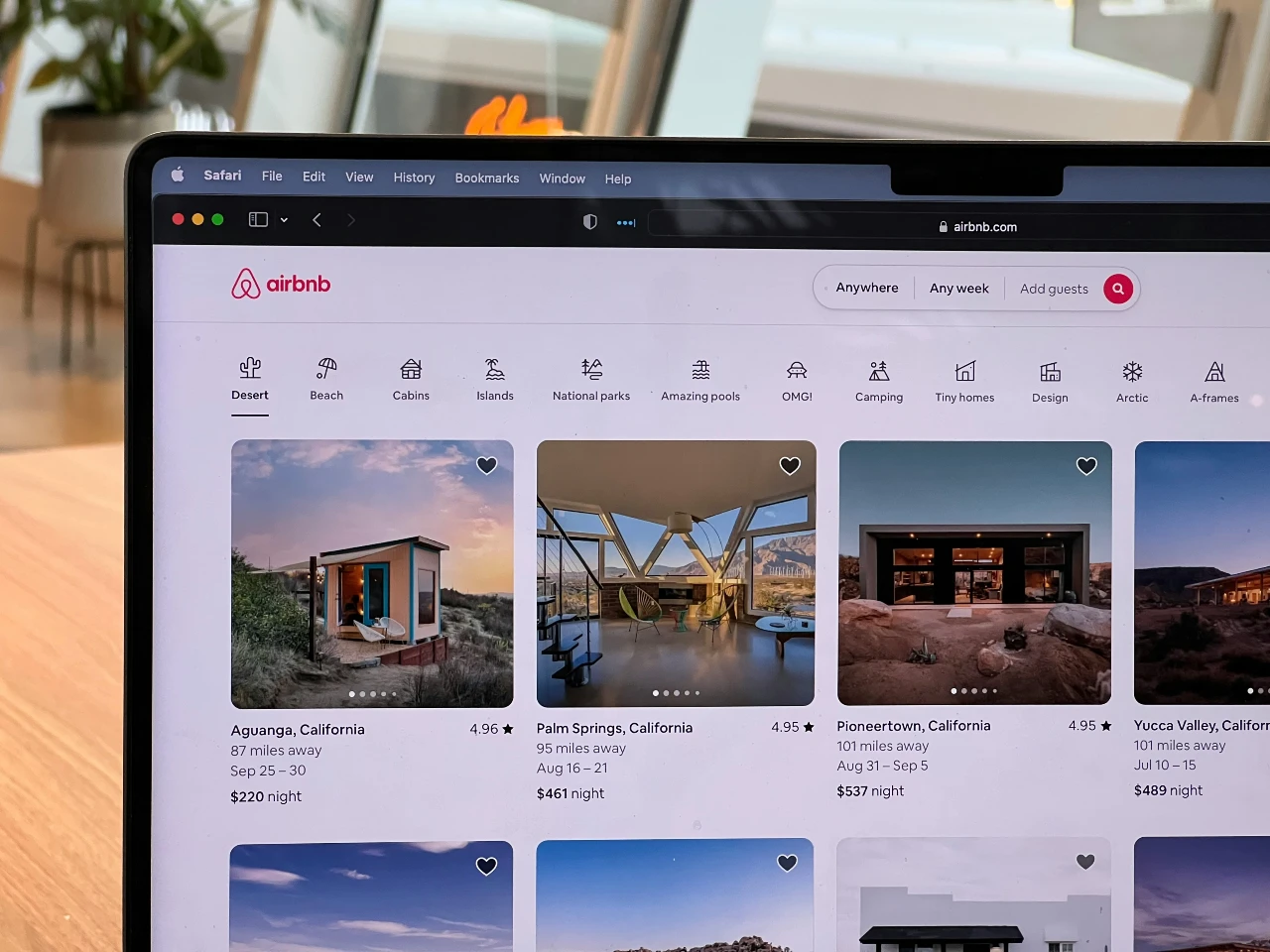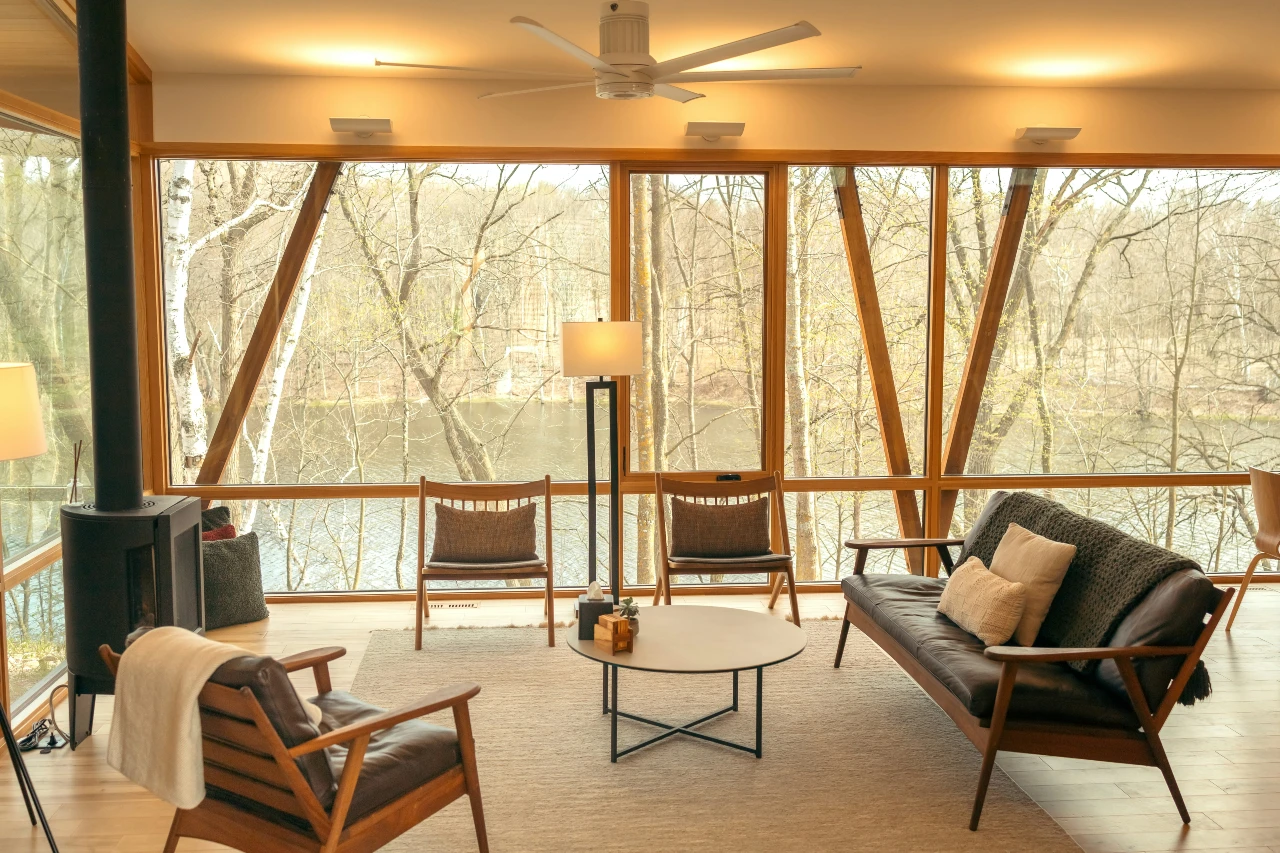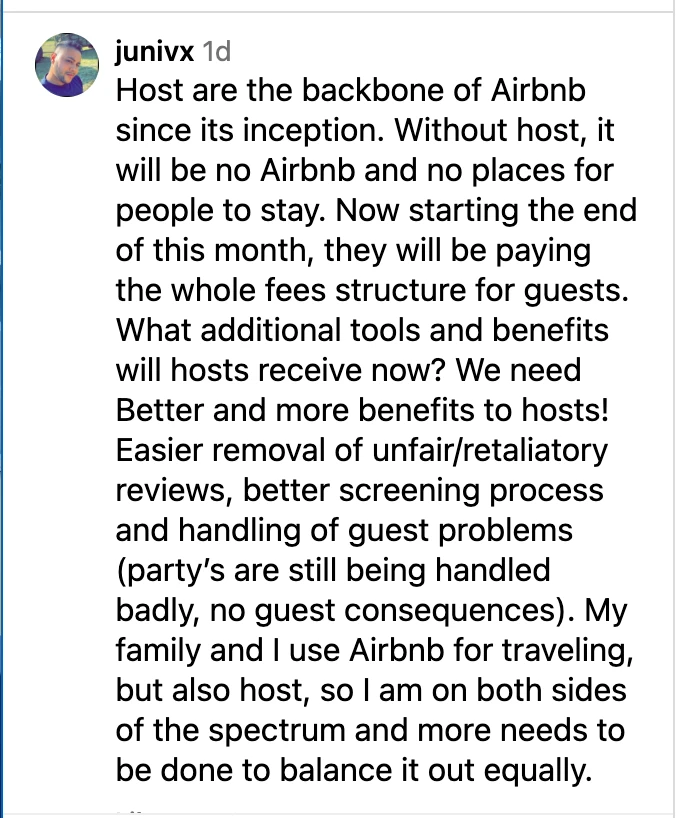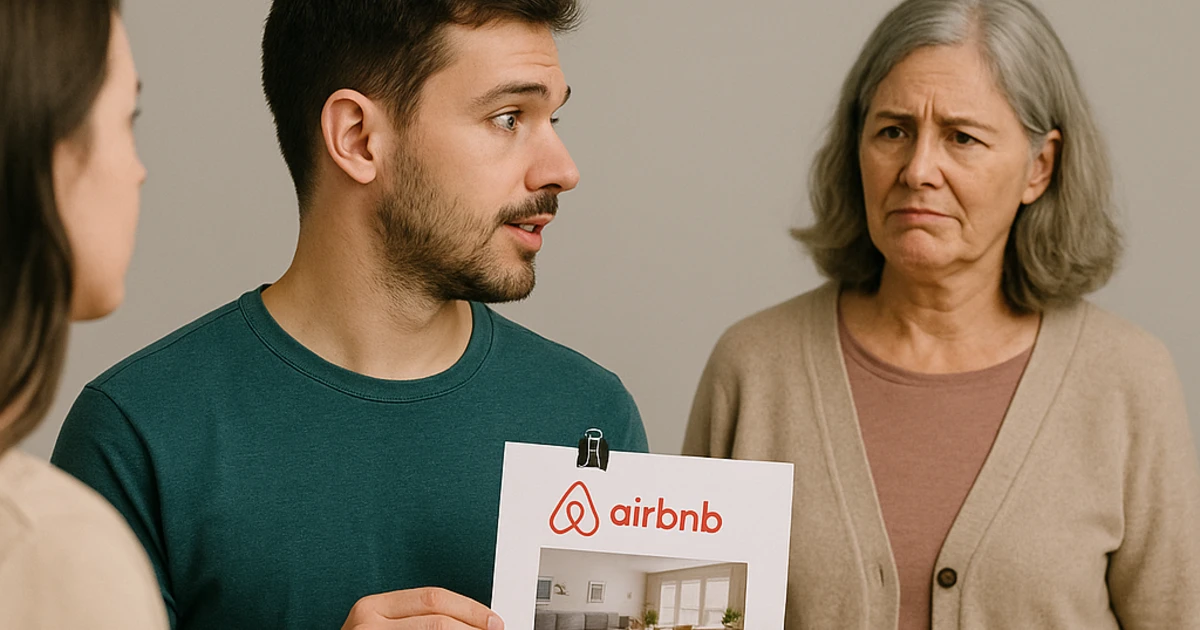On October 21, 2025, Airbnb CEO Brian Chesky unveiled 65 new features for the app, with a majority of them focused on improving the guest experience as a result of customer feedback.
From a top-end view, the app is turning into more a social platform, allowing users to connect with and message each other in new ways. Still, there were dozens of additional changes to how guests find, book and modify their stays, with repercussions for landlords as well.
The rollout includes a change to the list of rental properties a guest would see while searching the site, an improved AI assistant, and an expansion of the controversial "reserve now, pay later" function.
If you're renting out properties on Airbnb—whether in Texas, California, Florida, or anywhere else—here's what you need to know about Airbnb's latest rollout and what it means for your rental income.
Background and fee structure shift
Let's get this out of the way; these changes come overwhelmingly with the guest in mind, not the host. In a time of financial uncertainty, Airbnb clearly wants to keep customers on their platform and renting out vacation homes.
These new updates are rolling out soon after the short-term rental giant, which has over 5 million hosts worldwide, announced a change to the fee structure that took more of a percentage from hosts. Previously, hosts would only pay a 3 percent fee of every booking, with guests shouldering 14 to 16.5 percent. Now, there's a flat 15.5 percent fee that is taken out of the final price that guests see, and removed from the host's payout.
In addition, Airbnb announced sweeping changes to the hosting and payout experience in June that shifted more financial risk into the hands of landlords. Among them was implementing a "reserve now, pay later" feature that landlords feared would lead guests to manipulate the calendar and cause gaps in rental income.
Among these 65 new features are an expansion of reserve now, pay later, with the rest of the improvements largely geared towards the guest and not the host. While these are not nearly as drastic as the June rule change, they've received mixed reactions from the landlord community, and hosts should be aware of the implications.
Let's now get into the specifics.
Expanded search radius: new opportunities for Airbnb hosts
Let's start with an update that could end up being a huge benefit to short-term rental property owners—at least some of them. One of the most significant changes for hosts is how Airbnb handles search results when top listings are fully booked. Previously, if every highly-rated property in a city was unavailable, guests would be forced to search elsewhere or choose different dates.
Now, Airbnb will show more options. The search function will automatically expand the radius to show properties just outside the primary destination. Searching for Manhattan? You might see listings in White Plains, New York. Looking for downtown Austin? Properties in Round Rock could appear.
"We know there are great homes just outside the city, and we're going to show you them so you can discover amazing places to stay that you may have otherwise missed," Chesky said in the Instagram post.
This could be a game-changer for STR owners in suburban or exurban areas. If you've been considering purchasing rental property on the outskirts of major metropolitan areas, this algorithmic shift could increase your visibility to travelers who originally intended to stay within the city limits.
Properties close to a major city could suddenly see a spike in bookings, providing a guest is willing to stay farther outside the city limits (which, granted, is far from a guarantee). At the very least it's more guaranteed eyeballs on your property. And if you have a highly-rated property with a listing full of visually appealing photos, who's to say a traveler won't prefer that than a stuffy downtown condo, especially if the price is competitive?
Chesky did specify that this applied to the "best homes," implying properties that get great customer feedback and high ratings. It underscores Airbnb’s focus on 5-star reviews, reminding hosts how important it is to cultivate positive guest experiences and get them to report on it.

Improved interactive maps: why it matters for hosts
Airbnb has also overhauled its mapping interface in response to user complaints. The new interactive maps allow guests to see nearby restaurants, shopping centers, public transportation options, and other amenities. Travelers can tap on points of interest directly within the app to learn more.
While this seems purely guest-focused, there's a strategic angle for hosts. Properties near transit hubs, popular dining districts, or shopping areas will benefit from this increased transparency. If your rental is well-located, make sure your listing highlights these amenities in the description—because guests will now be able to verify these claims quickly.
Reserve now, pay later: a growing concern for hosts
Perhaps the most controversial feature is the global expansion of "reserve now, pay later." Originally launched in May 2025, this payment option allows guests to book stays without paying anything upfront. In his Instagram announcement, Chesky specifically called out this feature as "really popular" with travelers.
But popular with guests doesn't mean beneficial for hosts.
As we detailed in our article on Airbnb's cancellation policy changes, the buy now, pay later model creates financial risks for property owners. Similar to services like Klarna or Afterpay, this payment flexibility means guests can reserve dates on your calendar without any real financial commitment.
Here's the problem: If a guest cancels before completing payment, you could be left with blocked dates and zero compensation—even if they held that reservation for weeks. The cancellation might fall within Airbnb's acceptable timeline, meaning the platform won't require the guest to pay, and you won't receive anything for the lost booking opportunity.
This is especially concerning for STR landlords who rely on consistent rental income to cover mortgages, property taxes, and maintenance costs. The uncertainty makes cash flow projections more difficult and increases the risk of gaps between bookings. The fact that Chesky emphasized how "popular" this feature is suggests it's not going anywhere, and hosts will need to adapt to this new reality.
Enhanced AI assistant: easier changes, less predictability
Airbnb is expanding its AI-powered customer service assistant to provide "faster and more personalized help" to guests. While the company frames this as an improvement to Airbnb customer service (for reference, guests can also reach human support at 1-844-234-2500), the practical effect is that guests will find it easier than ever to modify, reschedule, or cancel their reservations.
The AI assistant can handle live changes to bookings, date adjustments, and various other modifications without human intervention. For travelers, this means less friction and more flexibility. For hosts, it means less predictability.
When guests can easily shift their plans—even with legitimate reasons—it creates uncertainty around occupancy rates and expected income. Improved customer service is always a good thing, but landlords should still be aware that it's getting easier for guests to cancel and reschedule.

Airbnb Experiences: connecting travelers before arrival
One genuinely innovative feature is the ability for guests booking Airbnb Experiences to see who else is attending and message them beforehand. This social connectivity feature aims to build community among travelers and make group experiences more appealing.
For hosts offering experiences in addition to accommodations, this could increase bookings—solo travelers may be more likely to book when they can connect with others first. However, for hosts only offering lodging, this feature doesn't provide any direct benefit.
The fee structure elephant in the room
It's worth noting that these 65 updates come at a time when Airbnb is shifting more of its fee structure onto hosts. Until recently, hosts paid a 3 percent fee for every booking, while guests paid anywhere between 14 to 16.5 percent.
Along with the reserve now, pay later function, the June rule changes eliminated the landlord-friendly strict cancellation policy (where guests could only get a half-refund if they cancelled after 48 hours), and even gave Airbnb the freedom to reverse rental income payments after the fact.
The comment sections on Airbnb's announcement posts tell a clear story: hosts feel overlooked.
One user, junivx, wrote: "Host are the backbone of Airbnb since its inception. Without host, it will be no Airbnb and no places for people to stay. Now starting the end of this month, they will be paying the whole fees structure for guests. What additional tools and benefits will hosts receive now?"

Another commenter, m4rcelo_m, noted: "Great updates for guests! But to be honest, it's been quite some time since we've seen any real improvements or new tools for Superhosts."
These aren't isolated complaints. As Airbnb continues to shift its fee structure, with hosts now absorbing more of the platform's costs and financial risk, many STR owners are questioning whether the platform is prioritizing guest acquisition over host support. Issues like unfair reviews, inadequate guest screening, and parties with minimal consequences remain largely unaddressed.
As junivx pointed out in their comment, hosts are now paying a larger share of the platform's costs while receiving fewer tangible benefits in return.
When guests pay lower fees, they're more likely to book—which theoretically benefits hosts. But when that's combined with features like reserve now pay later, easier cancellations, and AI-assisted modifications, the net result may be more bookings with less reliability and lower actual revenue for landlords.
Should STR owners consider alternatives?
With host sentiment souring, some property owners are exploring other platforms. VRBO offers a different approach to vacation rentals, with different fee structures and guest expectations. While Airbnb remains the dominant player, diversifying your listing presence across multiple platforms can reduce your dependence on any single company's policy decisions.
That said, Airbnb is still the king when it comes to STR platforms. It has over 100 million monthly users globally, and its name has become synonymous with short-term vacation rentals. If you own an STR, Airbnb is still the first place you'll likely want to list it. Quite simply, it has the most customers, and there's nothing worse than a vacancy.
At the end of the day, the investors who keep a close eye on their rental portfolio, properly crunch the numbers and maintain a high standard of customer satisfaction will have the most success with STRs—on Airbnb or elsewhere.
Read more: The hidden risks that Airbnb arbitrage hosts overlook
Protecting your rental property in 2025
Regardless of which platform you use or how Airbnb's features evolve, one thing remains constant: you need proper insurance coverage for your rental property. As these policy changes demonstrate, platforms will continue to prioritize their own growth and guest experience—often at the expense of host stability and predictability.
Whether you're operating a single vacation rental in North Carolina or managing multiple properties across different states, comprehensive landlord insurance protects you from the risks that platform-provided coverage simply doesn't address. This includes loss of rental income due to cancellations, liability gaps, property damage beyond AirCover's limits, and legal expenses.
The bottom line for Airbnb hosts
Airbnb's 65 new features represent the platform's continued investment in the guest experience. Enhanced search capabilities, improved maps, payment flexibility, and AI-powered assistance all make booking and modifying stays easier for travelers.
But for hosts and landlords? The picture is more complicated. While the expanded search radius may benefit properties outside major cities, features like reserve now pay later and simplified modification tools introduce new unpredictability into rental income. The absence of meaningful host-focused improvements—better review dispute systems, enhanced guest screening, stronger consequences for problematic guests—underscores a growing divide between platform priorities and host needs.
If you're an Airbnb host navigating these changes, the best strategy is to stay informed, maintain proper insurance coverage, and consider diversifying your platform presence. The vacation rental landscape is evolving rapidly, and adaptability is key to long-term success—even when the platforms themselves seem to be evolving away from host interests.
At Steadily, we insure short-term rental properties on Airbnb, VRBO and beyond from perils such as fire, storms and vandalism. Get a quote today.






.png)
.jpg)
.jpg)


.png)